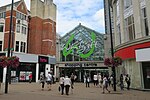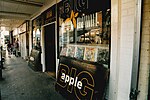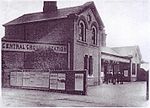Kennards

Kennards was a small department store chain that was started in 1853, founded on the principle of selling reliable goods at low profit margins. Its main Croydon branch was notable for the full-length windows which ran the length of the store. The shop was bought out by Debenhams in 1928 but not rebranded until 1973. The site was later obtained for development for the new Drummond Centre in the 1980s and the original store was demolished. The new store was sited on some of the original footprint and anchored the Drummond Centre, which was later expanded and renamed Centrale. This store continued to anchor the centre until Debenhams announced its closure in 2020.
Excerpt from the Wikipedia article Kennards (License: CC BY-SA 3.0, Authors, Images).Kennards
North End, London Broad Green (London Borough of Croydon)
Geographical coordinates (GPS) Address Nearby Places Show on map
Geographical coordinates (GPS)
| Latitude | Longitude |
|---|---|
| N 51.3744 ° | E -0.1007 ° |
Address
Centrale
North End
CR9 1SD London, Broad Green (London Borough of Croydon)
England, United Kingdom
Open on Google Maps











